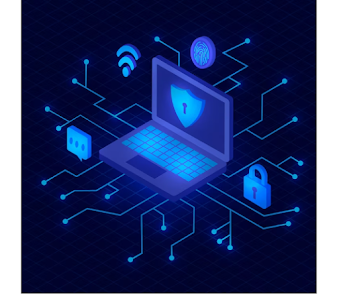As the world becomes increasingly digital, the importance of cybersecurity has never been more critical. In 2024, our dependence on technology has grown exponentially, encompassing every aspect of our lives—from personal communication to financial transactions, and even critical infrastructure. Cybersecurity, therefore, is not just a concern for tech companies or IT departments; it is a necessity for everyone. This blog explores why cybersecurity is so important in 2024 and provides actionable steps to protect yourself and your digital assets.
1. The Evolving Cyber Threat Landscape
The cybersecurity landscape is constantly evolving, with new threats emerging every day. Cybercriminals are becoming more sophisticated, employing advanced techniques such as AI-driven attacks, ransomware, and phishing scams to exploit vulnerabilities. Here are some key trends in the cyber threat landscape:
Ransomware Attacks: Ransomware continues to be one of the most prevalent and damaging types of cyberattacks. In these attacks, hackers encrypt a victim's data and demand a ransom for its release. In 2024, ransomware attacks have become more targeted, focusing on critical sectors such as healthcare, finance, and government.
Phishing and Social Engineering: Phishing attacks, where attackers deceive individuals into revealing sensitive information, remain a significant threat. Social engineering tactics have also evolved, leveraging psychological manipulation to trick individuals into compromising their own security.
AI-Powered Attacks: Cybercriminals are increasingly using artificial intelligence and machine learning to automate attacks, analyze vast amounts of data, and identify vulnerabilities more efficiently.
Supply Chain Attacks: These attacks target less secure elements within a supply chain to access more secure systems. The interconnectedness of global supply chains has made this type of attack more prevalent and dangerous.
2. The Cost of Cyber Insecurity
Cybersecurity breaches can have devastating consequences for individuals, businesses, and governments alike. The costs of cyber insecurity are not just financial; they also include reputational damage, loss of customer trust, and legal ramifications.
Financial Losses: Cyberattacks can result in significant financial losses. Businesses may face costs related to ransom payments, system recovery, lost productivity, and regulatory fines.
Reputational Damage: A data breach can severely damage an organization’s reputation, leading to loss of customer trust and, ultimately, a decrease in business.
Legal Consequences: With the introduction of stringent data protection laws such as the General Data Protection Regulation (GDPR) in Europe and the California Consumer Privacy Act (CCPA) in the United States, businesses are under increased legal pressure to protect user data. Non-compliance can lead to substantial fines.
3. Why Cybersecurity is Important for Everyone
While large corporations and government entities are often the most visible victims of cyberattacks, individuals are not immune. Here’s why cybersecurity is important for everyone:
Personal Data Protection: Our digital footprints contain a wealth of personal information, from social security numbers to banking details. Cybercriminals can exploit this information for identity theft, fraud, and other malicious activities.
Safeguarding Digital Devices: With the proliferation of the Internet of Things (IoT), our homes are filled with smart devices—from phones and computers to smart fridges and thermostats. These devices, if not properly secured, can serve as entry points for cybercriminals.
Preventing Unauthorized Access: Protecting devices and online accounts with strong, unique passwords and enabling multi-factor authentication (MFA) can help prevent unauthorized access.
4. How to Protect Yourself: Best Practices for Cybersecurity
Protecting yourself in the digital world requires a proactive approach. Here are some best practices for enhancing your cybersecurity:
Use Strong, Unique Passwords: Avoid using the same password across multiple accounts. A strong password should be at least 12 characters long, combining letters, numbers, and special characters. Consider using a password manager to securely store and generate complex passwords.
Enable Multi-Factor Authentication (MFA): MFA adds an extra layer of security by requiring a second form of verification (like a text message code) in addition to your password.
Regularly Update Software: Ensure that your operating system, applications, and antivirus software are up to date. Software updates often include patches for security vulnerabilities.
Be Wary of Phishing Scams: Be cautious of unsolicited emails, messages, or phone calls requesting sensitive information. Verify the source before clicking on links or downloading attachments.
Use a Virtual Private Network (VPN): A VPN encrypts your internet connection, protecting your online activities from eavesdroppers, especially when using public Wi-Fi networks.
Backup Your Data: Regularly back up important data to a secure, offsite location. In the event of a ransomware attack, having a backup can save you from paying a ransom to recover your files.
Educate Yourself and Others: Stay informed about the latest cybersecurity threats and educate those around you. Awareness is a powerful tool in preventing cyberattacks.
5. The Future of Cybersecurity
Looking ahead, cybersecurity will continue to evolve in response to emerging technologies and threats. As AI and quantum computing develop, new challenges and opportunities will arise. Here are some future trends to watch:
Quantum Computing: While still in its early stages, quantum computing poses a potential threat to current encryption methods. Researchers are working on developing quantum-resistant cryptography to counter this threat.
Zero Trust Security Models: The zero trust approach assumes that threats could come from anywhere, and thus, no user or system should be trusted by default. This model is becoming more prevalent as organizations strive to secure increasingly complex IT environments.
Increased Regulation and Compliance: Governments around the world are enacting stricter regulations to protect consumer data and privacy. Compliance with these regulations will become more crucial.
Conclusion
Cybersecurity is an essential aspect of our digital lives in 2024. With cyber threats constantly evolving, it’s crucial to stay informed and take proactive measures to protect your personal information and digital assets. By understanding the importance of cybersecurity and following best practices, you can help safeguard your digital life against potential threats.
Stay safe online!


0 Comments